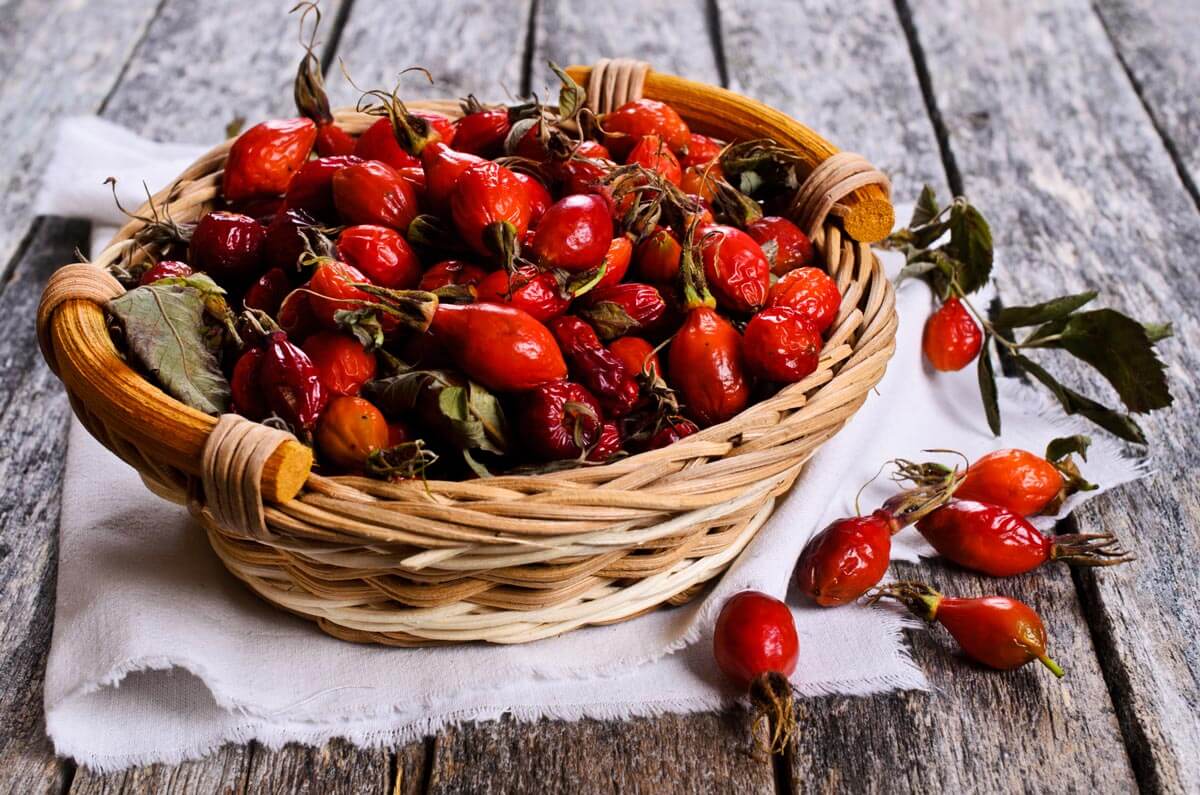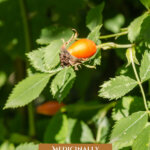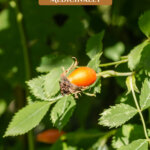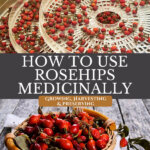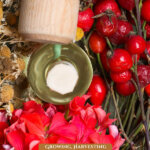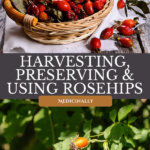This post is filled with all things rosehips for natural medicinal purposes. Including the benefits of rosehips, why we should be growing our own rosehips, harvesting, preparing, drying, and using rosehips medicinally.
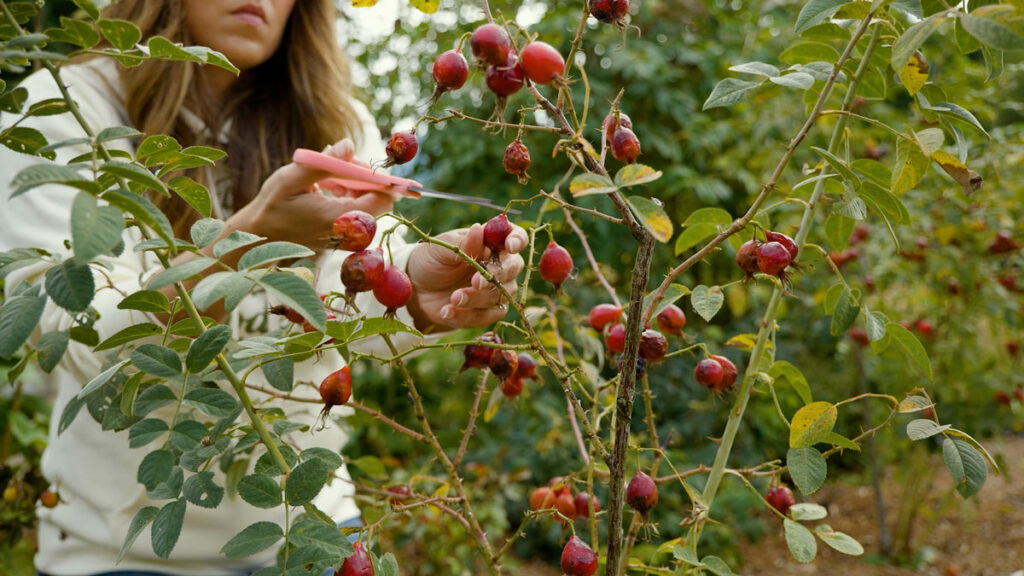
I'm excited to have CeAnne with us from Farmhouse Teas. CeAnne has been with us before discussing how to make your own medicinal tea, and she shows up in the academy from time to time. She also happens to own Farmhouse Teas which is where I source any herbs or teas that I don't grow and make myself.
She's also created kits for members of the Pioneering Today Academy for making herbal remedies a breeze in your own home. If you haven't checked out all Farmhouse Teas has to offer, be sure to do so after listening to this episode.
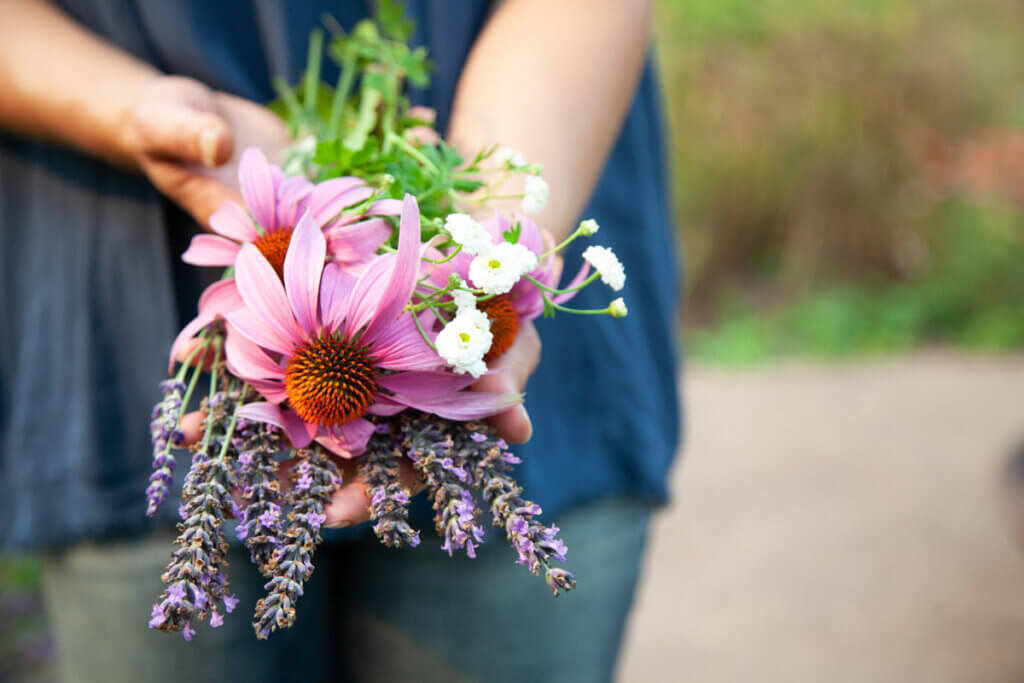
Herbal Course
Before we move on, I have to tell you about my herbal course, Practical Home Herbalism for Cold and Flu Season. Gain the confidence of knowing exactly what remedy to make and having a cabinet stocked full of natural medicine for your family to use at a moment’s notice with this course.
FREE Mini-Herbalism Course
It's not too late to join my mini herb course (2023). If you want a solid foundation for treating yourself and your family with herbs, sign up for this free course.
But for now, it's back to the topic at hand. In today's episode (Pioneering Today Podcast episode #322) we're discussing all things rosehips, and in the video, I'm sharing how to harvest and preserve rosehips!
Why I Love Roses
Many people don't think of the medicinal benefits of rosehips. In fact, many people don't know the bulb left over after a rose bloom is spent can be used for anything at all! Roses are beautiful to look at and, when cared for properly, will grace your garden year after year with beautiful blooms.
Both the petals and the rosehips have many medicinal benefits as well!
It's important to note that I am not a certified medical practitioner. This post is not intended to diagnose or treat but is for informational purposes only. Please contact your healthcare professional before introducing new herbal and natural remedies into your wellness routine.
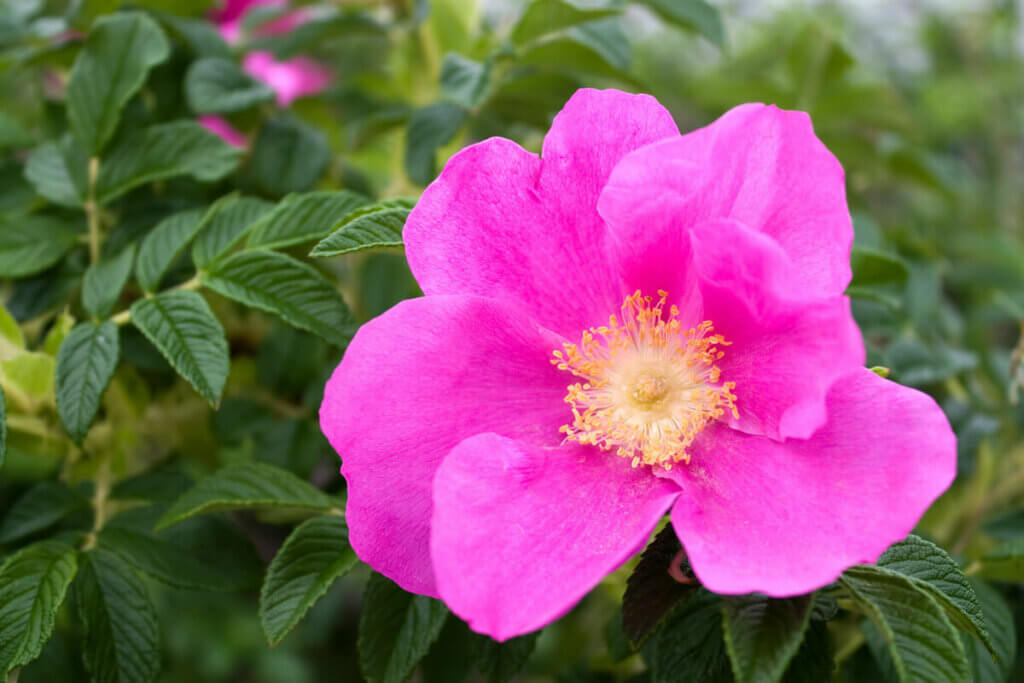
Roses that Produce Rosehips
Not all roses produce rosehips. Many of the more popular roses have been modified for the hips to be bred out. You may notice many rose bushes that don't leave an orange or red rosehip after the petals have fallen from the bloom.
Here are some rose bushes that will produce rosehips great for medicinal uses:
- Dog-Rose
- Rosa Rubifolia
- Rosa Canina
- Rugosa Rose
- Rosa ‘Fru Dagmar Hastrup
- Rosa Spinosissima
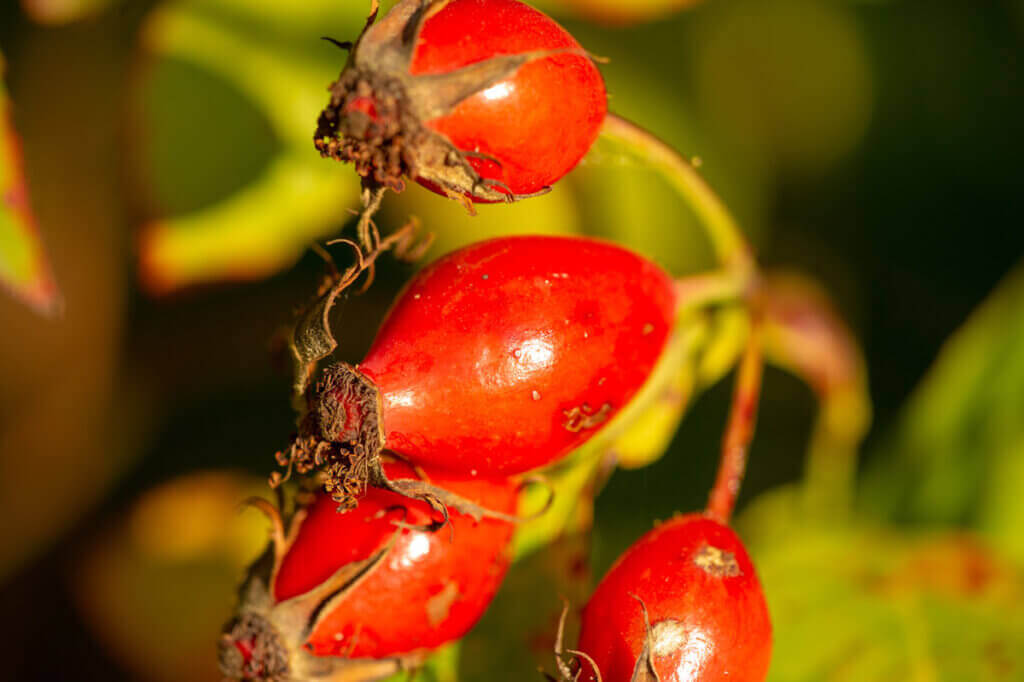
Benefits of Rosehips
There are many benefits of rosehips which makes them a great addition to any medicinal herb garden. Not only are they beautiful, but they pull double duty by being able to use rose petals and the rosehips.
Vitamin C
Rosehips are filled with vitamin C. As we all know, vitamin C is great for immune support and keeping colds and the flu at bay. In fact, one teaspoon of rosehips contains the equivalent amount of vitamin C as eating 5-6 oranges! (Source)
You can also grow rosehips in many more climates than you can grow an orange tree, this is especially helpful for those northern growing zones like Oregon and Washington where CeAnne and I live.
Growing your own vitamin C source is a fantastic way to becoming more self-reliant, so growing roses for their rosehips is much more realistic for me than an orange tree. You're also getting a lot more vitamin C for the size, making long-term storage much easier as well.
Respiratory Aid
Another benefit of rosehips is that they're great to consume when dealing with upper respiratory issues. Not just for their vitamin C, but also because they can help with cold symptoms that accompany a cold. (Source)
Inflammation/Joint Pain
Furthermore, rosehips can be a great addition to your herbal medicine cabinet if you deal with joint pain, inflammation or osteoarthritis. (Source)
This is especially true during the colder winter months as most people suffer more with joint pain when the weather is damp and cold.
Important Note: Whenever you're using any herbal medicine or plant, do adequate research to ensure it won't interact with any medications you're on. If you have special health conditions, be sure to check with your medical practitioner.
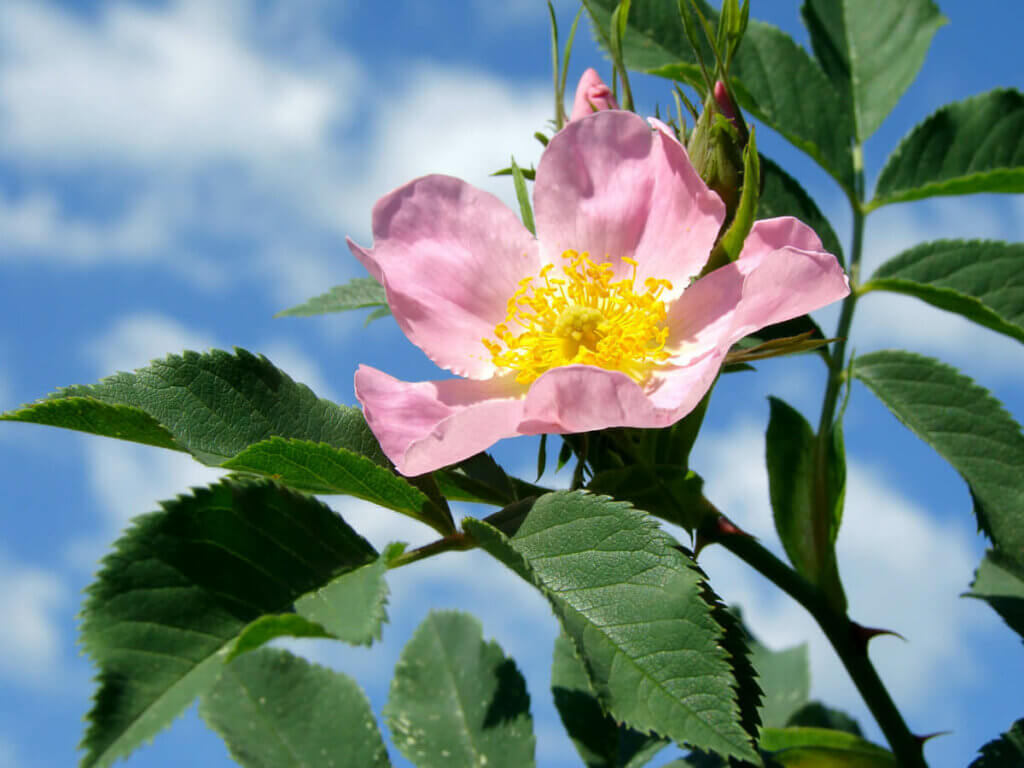
Growing Roses for Rosehips
If I'm growing rosehips for medicinal purposes, you all know that my mind immediately jumps to how many bushes I will need to have enough rosehips to last an entire year for my family. So how many roses will I need to do this?
This is extremely hard to determine because it depends on so many factors: how often you're using rosehips, the size of your family, what your soil is like, how mature your rose bush is, how much you're able to harvest per plant, etc.
If you're on a budget, a safe starting point is to plant between one and three bushes per person to grow enough rosehips for a year. Once your rosehips have matured (which will take many years), you can always reevaluate your needs.
If you have the means to buy more, then by all means plant upwards of five bushes per person in your family. Do take into consideration the full, mature size of the plant. It may be helpful to talk to your local extension office, or even a local nursery.
Buying older, more mature potted rose bushes from a nursery will give you a head start, too! But just know you'll pay more per bush this way.
You can check out my other posts where I discuss how many berry bushes you'll need per person here, and you can read how much to plant for a year's worth of veggies per person here.
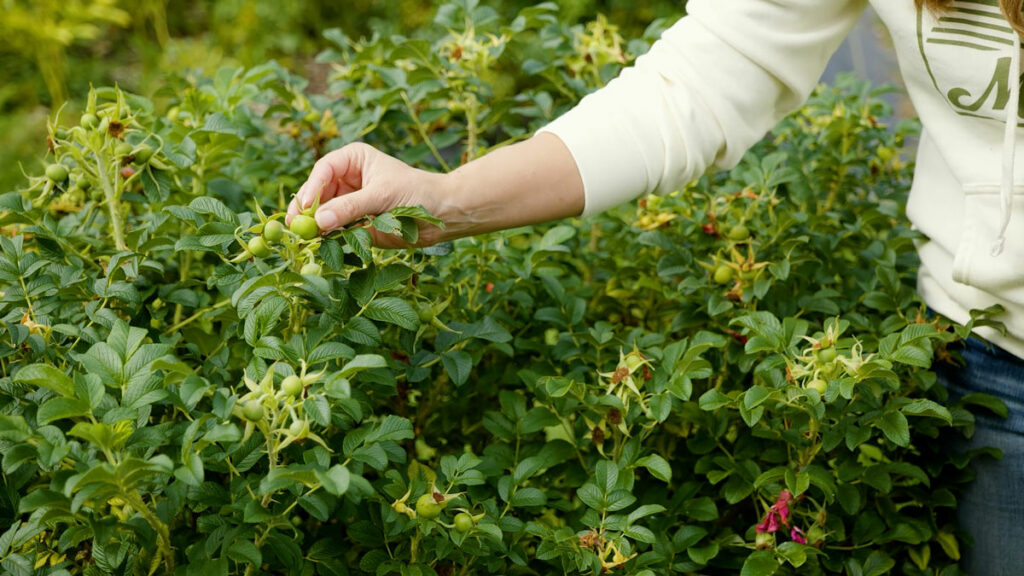
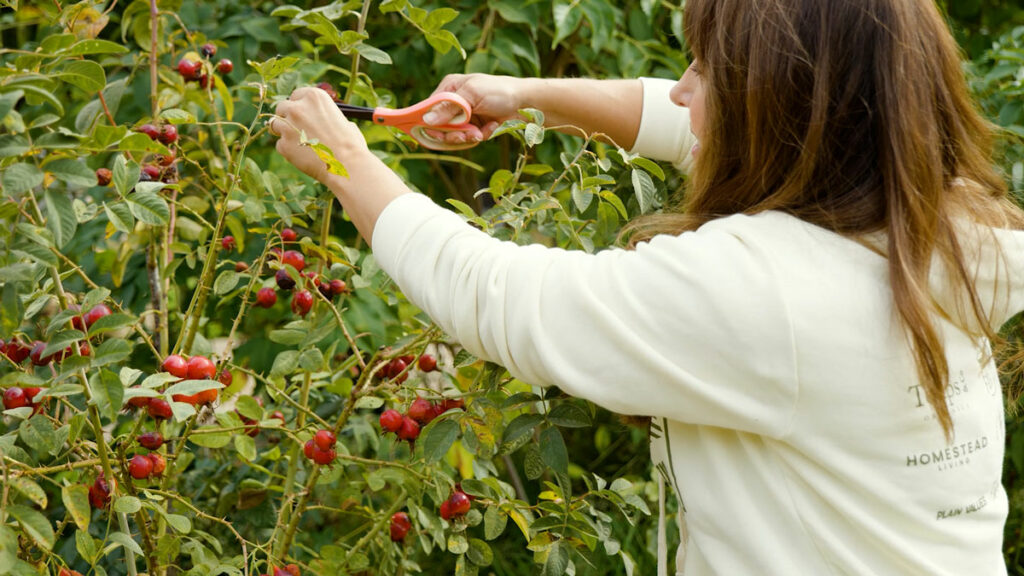
Harvesting Rosehips
It's best to wait until after the first frost before harvesting rosehips. They'll be a lot sweeter at this point as well as easier to pick off of the bush.
However, we don't want any rosehips to go to waste, so if you have roses that bloom earlier in the season, you can still harvest and preserve those rosehips as well.
I happen to have a combination of early and late rosehips. Those that I think will last long enough to go through a frost I'll leave on the bush. Those that are in their prime earlier, I'll harvest.
To harvest rosehips simply pluck them off the stem or use kitchen shears if they don't come off easily.
You may wish to wear long sleeves and gloves, after all, roses are known for their thorns.
Pro Tip: When choosing rosehips, look for those that are firm, bright and plump. You don't want to preserve rosehips that are already showing signs of deterioration such as blemishes, shriveling, or rotten spots. Whenever we're preserving, we want to be sure the product is in its prime.
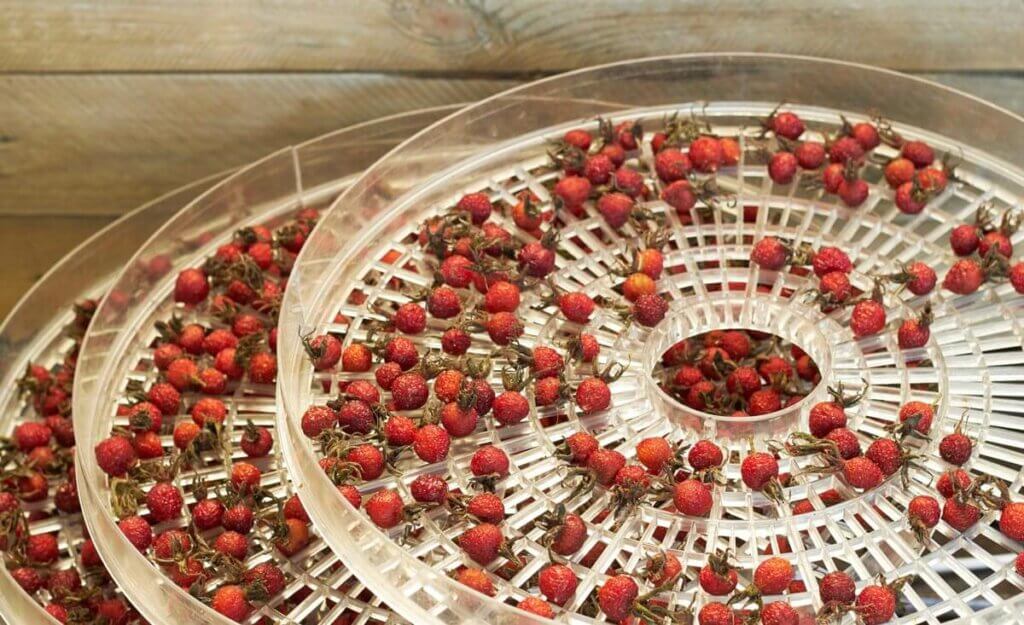
Preserving Rosehips
In order to keep rosehips for long-term storage, you'll want to dehydrate them. If you're going to use them within a couple of weeks of picking, you can use them fresh. However, once dry you can store them for up to a year.
Some varieties of rosehips will have larger seeds and depending on how you're using the rosehips that may be undesirable. I recommend de-seeding the rosehips by cutting them in half and removing the seeds with a spoon. This will also help them dehydrate much faster. (You can save those seeds to make rosehip oil! Read more on that below.)
Furthermore, sometimes rosehips have tiny hairs that can irritate, so this is also another reason to deseed them first. However, if you see no signs of insect damage, you can dehydrate rosehips in their whole form.
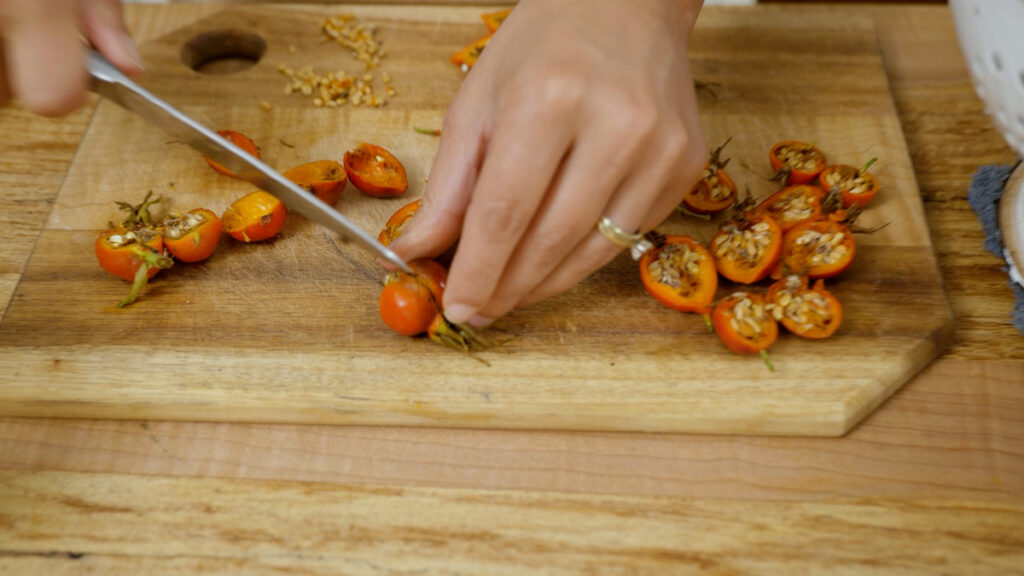
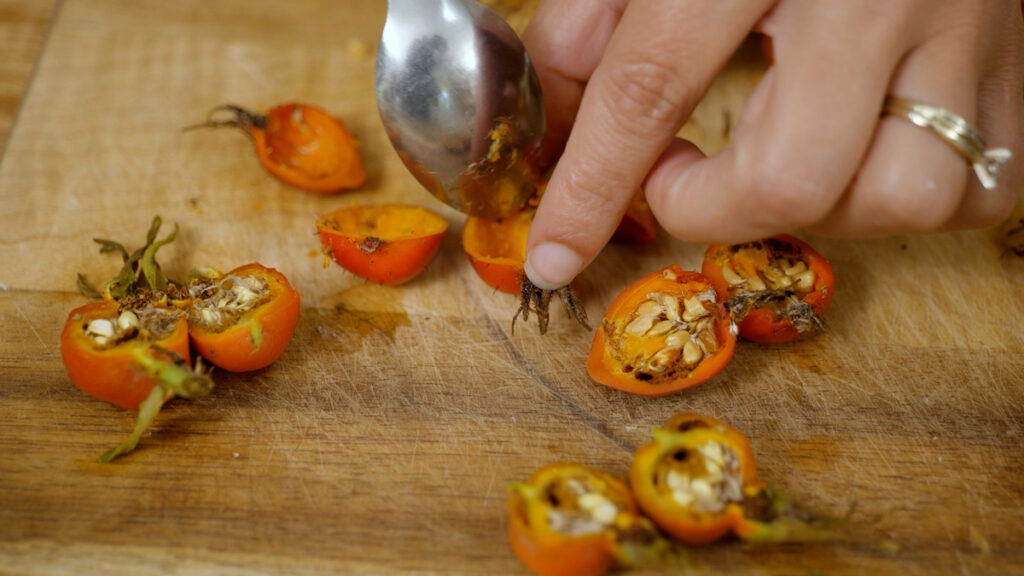
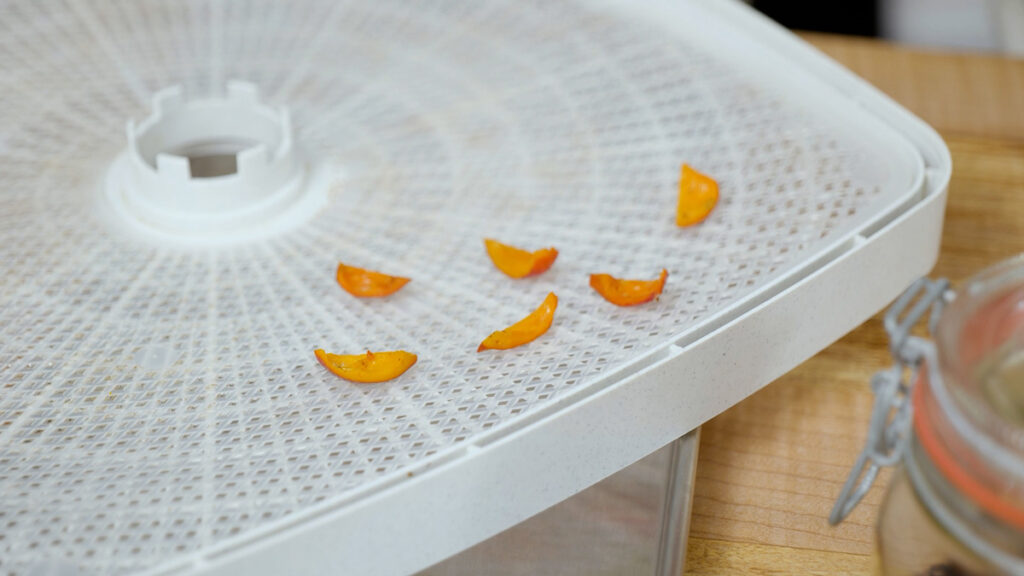
To Dehydrate Rosehips
- Harvest rosehips from the bush – Choosing rosehips that are in their prime. Remember, they'll taste sweeter if they've been able to go through a frost.
- Cut in half and remove the seeds and stem – optional, but ideal for faster dehydration or to inspect the rosehips for signs of insects.
- Lay them out on dehydrator trays – in a single layer.
- Dehydrate until completely dry – Dehydrate the rosehips at 125 degrees F. Don't go much higher than 145 degrees F. It's always best to dehydrate at a low enough temperature to preserve it but a high enough temperature to prevent mold. This will vary based on your climate and humidity. If you're concerned about mold at all, it's always better to be on the safe side and dehydrate at about 135 degrees F to be sure they're getting preserved before molding.
- Store in an airtight container (oxygen absorbers will help prolong the shelf-life) – Rosehips, when stored correctly, should last up to a year.
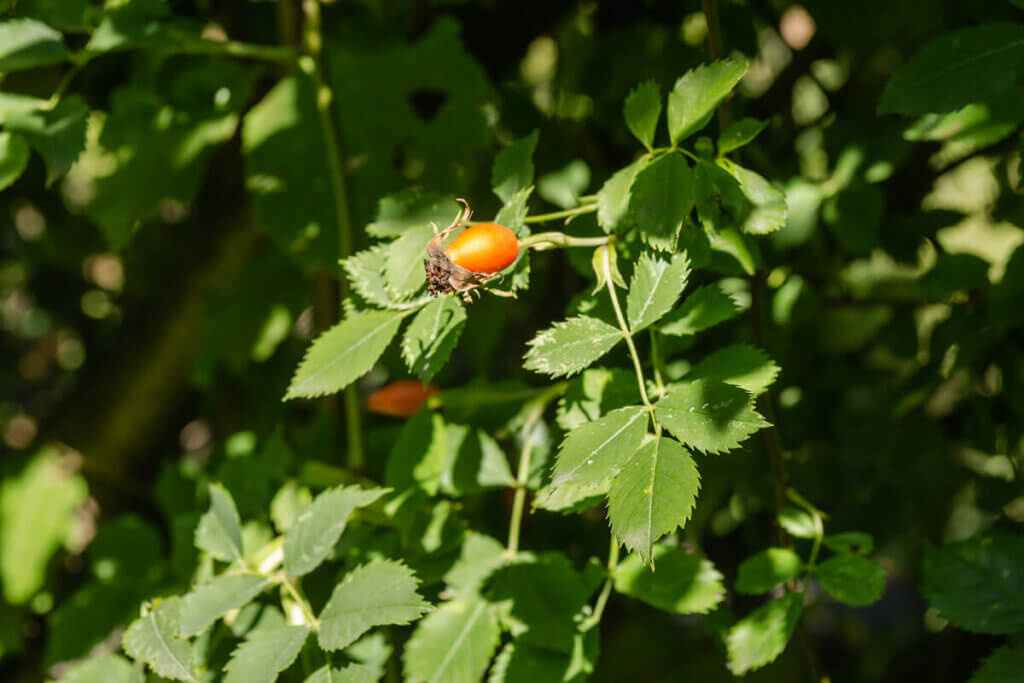
What Do Rosehips Taste Like?
Rosehips have a flavor that is somewhere between hibiscus and cranberry. They're not quite as sweet as a cranberry, but they would go well with any flavor profile that would go well with a cranberry.
They pair well with the flavors of cinnamon, nutmeg, ginger, and clove. I also love to add rosehips to my homemade elderberry syrup recipe when I want that extra boost of vitamin C.
You can actually grab CeAnne's elderberry herbal mixture, as well as some of my favorite herbal remedies such as the “Naggin Noggin Tea”, my “First Signs Tincture”, “Fire Cider”, and so much more at Farmhouse Teas!
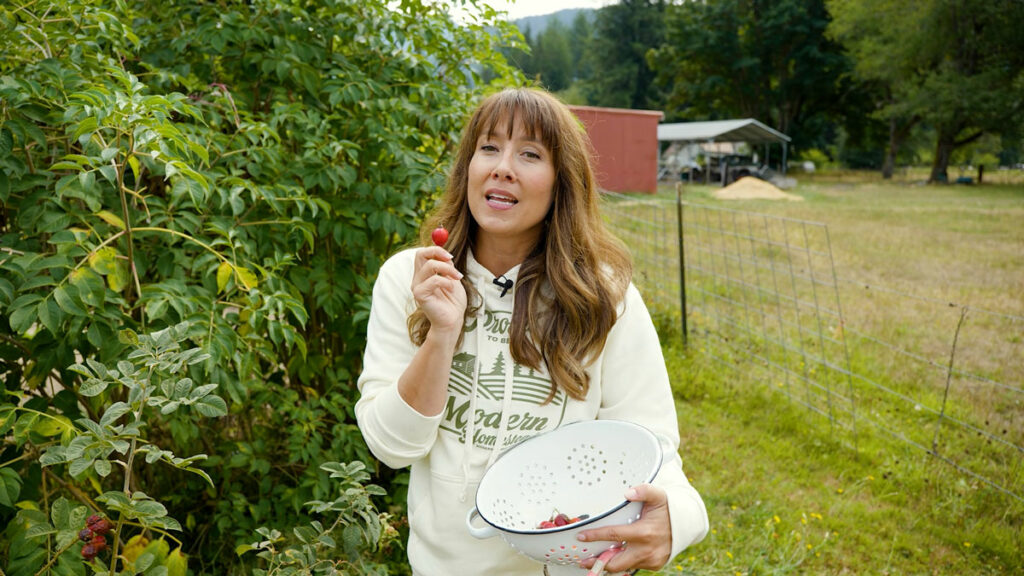
Best Ways to Use Rosehips
CeAnne's favorite way to use rosehips is to make tea with them. But there are many ways you can get the benefits of rosehips and all their medicinal properties.
It's best not to grind your dehydrated rose hips until just before you're ready to use them. The medicinal properties start to diminish once the surface area is exposed to air, so the smaller the pieces, the quicker they'll break down.
I like to store my rosehips in pieces (or whole form), then grind up enough for a week or two of tea (or whatever else I'll be using them for).
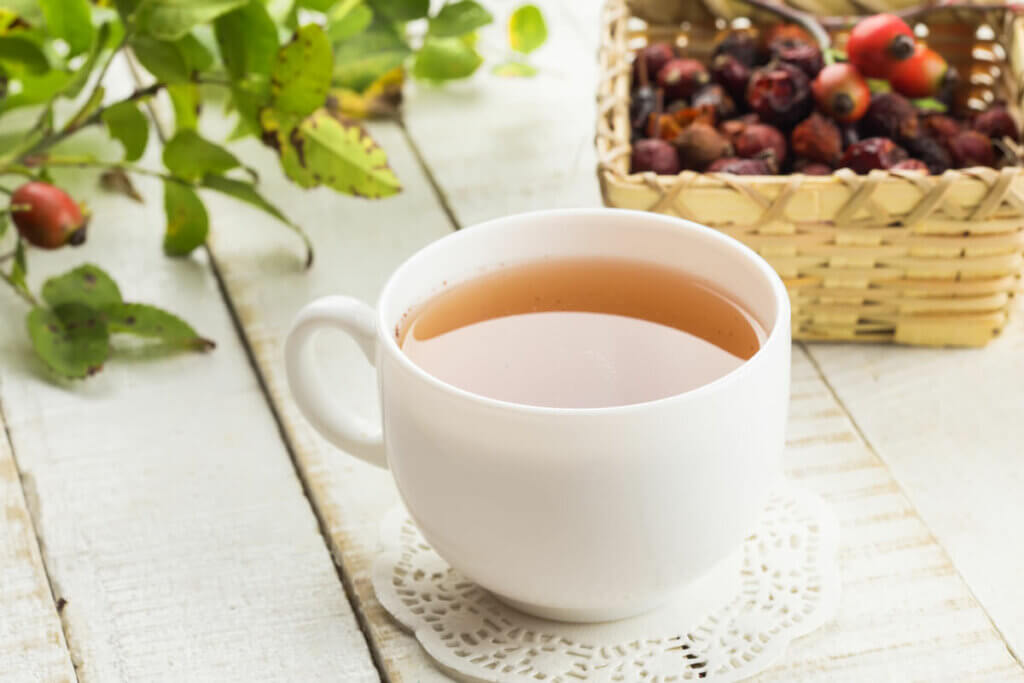
Rosehip Tea
The easiest way to make rosehip tea is just to steep 1 teaspoon of dried rosehips in water on the stovetop at a low simmer (not a boil) for 5-7 minutes. Strain the rosehips out, add honey if desired, sip and enjoy.
If you want to drink rosehip tea more for the medicinal benefits, CeAnne suggests increasing the rosehips to 1 Tablespoon and steeping for 15-20 minutes before drinking.
This may be a bit tart to drink, so you can add honey to help offset the flavor. Or, if you don't enjoy that strong of a tea, just drink the regular rosehip tea more often to get the same benefits.
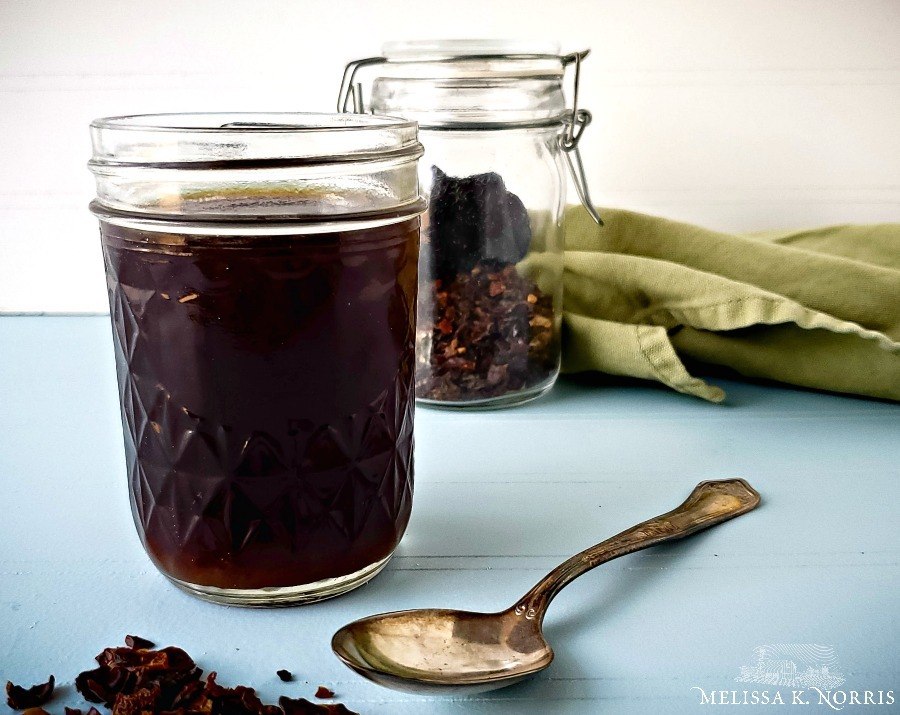
Rosehip Syrup
Rosehip syrup is simply a rosehip tea that you steep in water on the stovetop for 20-25 minutes at a low simmer until the liquid is reduced by half. Then you can add in honey or maple syrup to sweeten it and store it in the refrigerator.
You can use this syrup on pancakes or waffles, or as a sweetener to other teas for a delicious sweet flavor.
Rosehip Tincture
Making a rosehip tincture is the best way to preserve rosehips indefinitely. Simply take your rosehips and steep them in 90 proof alcohol (Everclear Vodka is a popular choice) or glycerin for 6 weeks. Then strain the rosehips out and use a dropper-full in a glass of water any time you need a boost of vitamin C.
Using Rosehips In Cooking
Rosehips are best for cooking if they're fully hydrated. But you can easily use rosehips in recipes that call for things like raisins or cranberries. Rosehip muffins would be a great treat!
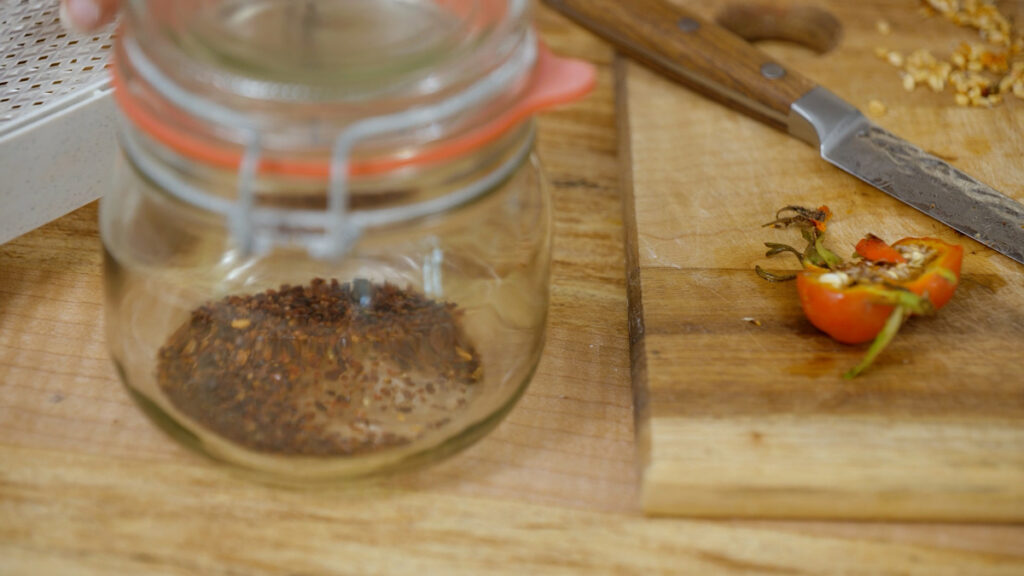
Powdered Rosehips
Sometimes people like to use powdered rosehips for their medicinal benefits, or for mixing into recipes where you can't steep or use the berries.
If you have a freeze dryer, this will be a very easy process as you simply freeze-dry the rosehips, then pulse them in a food processor until they're a fine powder.
If you are thinking of dehydrating vs. freeze-drying, they are not the same thing. The end product is very different.
I absolutely adore my freeze dryer from Harvest Right! You can check out the Harvest Right freezer dryers here.
If you don't have a freeze dryer, you can oftentimes buy rosehip powder. Just be sure it's from an organic and reputable source (like this organic rosehip powder from Farmhouse Teas).
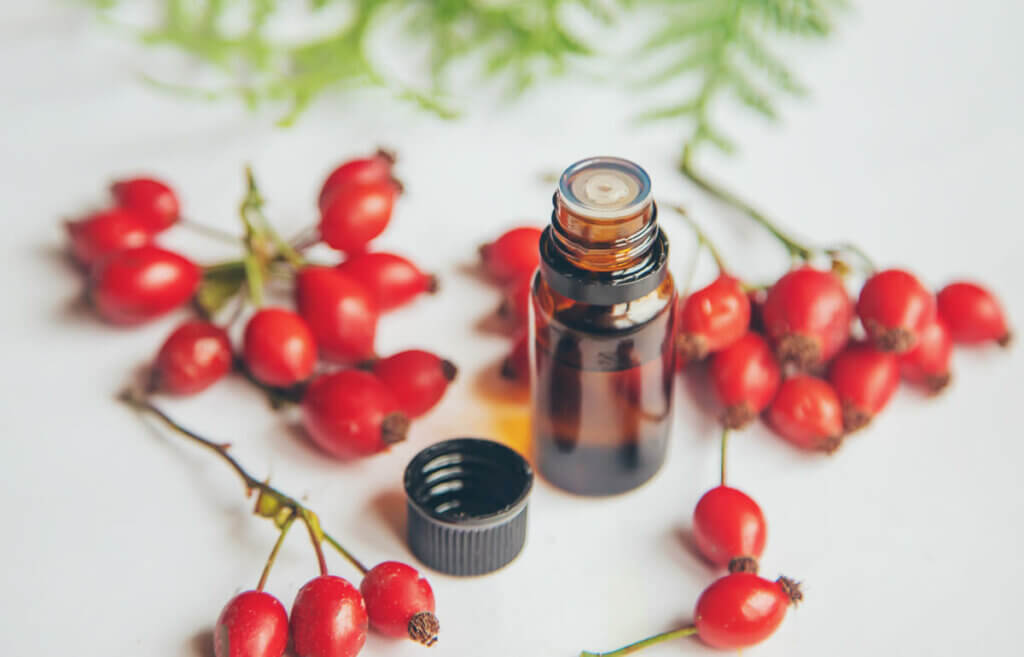
Rosehip Oil
The seeds of the rosehips contain powerful antioxidants and beneficial organisms for anti-inflammatory properties, reducing the signs of wrinkles, speed up healing of skin, and even for helping prevent acne. (Source)
You can make your own rosehip oil by simply steeping mashed fresh or dehydrated rosehips into an oil of your choice (be sure to choose an oil you want to use on your skin, such as jojoba oil).
Mix the rosehips with oil at a ratio of 1:2 and steep in an ovenproof dish at 100 degrees F for 8 hours.
Move the mixture to a dark place to cool down and settle for an additional 2 hours.
Strain the oil from the rosehip mixture and store it in a dark amber glass bottle or dropper vial. You can add in a few drops of vitamin E to help extend the shelf-life, but rosehips already contain vitamin E so this may not be necessary.
Use 2-3 drops of this rosehip oil on your skin daily!
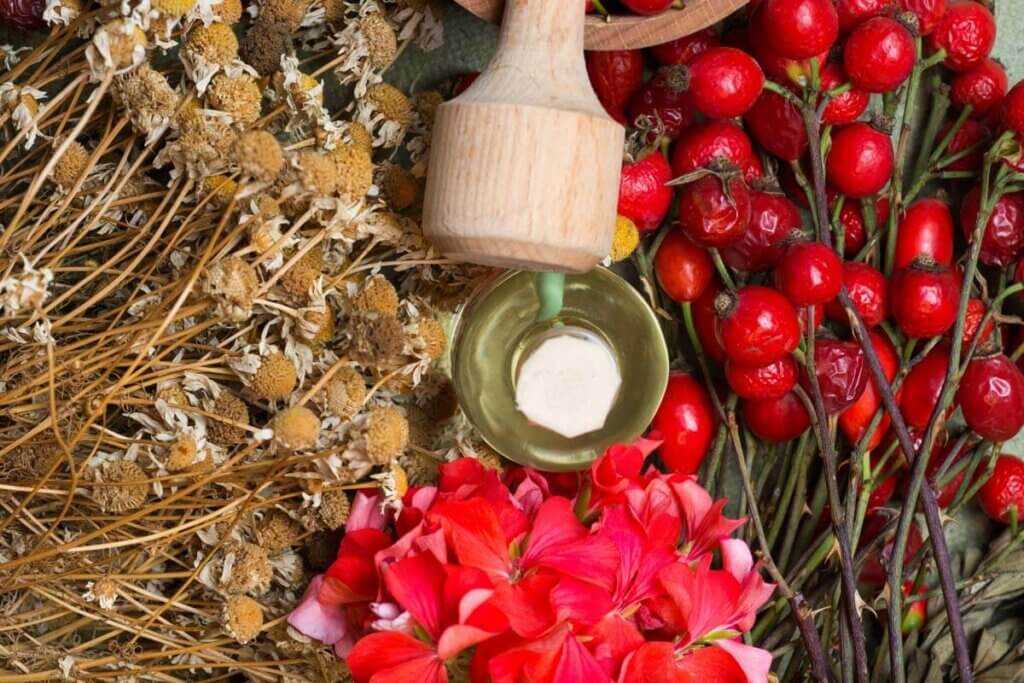
Rosehip Precautions
Be sure to do your own research, but here's what Dr. Clare, from the Academy of Herbal Medicine has to say about rosehip uses:
Orally, rosehip is used as a supplemental source of dietary vitamin C, for preventing and treating colds, influenza-like infections, infectious diseases, vitamin C deficiencies, fever, increasing immune function during exhaustion, gastric spasms, gastric acid deficiency, preventing gastric mucosal inflammation and gastric ulcers, and as a “stomach tonic” for intestinal diseases. It is also used orally for diarrhea, gallstones, gallbladder ailments, lower urinary tract and kidney disorders, dropsy (edema), gout, aging skin, disorders of uric acid metabolism, arthritis, sciatica, diabetes, increasing peripheral circulation, for reducing thirst, as a laxative and diuretic, and to treat chest ailments.
In foods and in manufacturing, it is used for rosehip tea, jam and soup, and as a natural source of vitamin C
Dr. Clare's Academy
For the list of adverse reactions, as well as interactions with different herbs and supplements, visit the website here.
CeAnne has a monograph on roses with additional information you can check out as well.
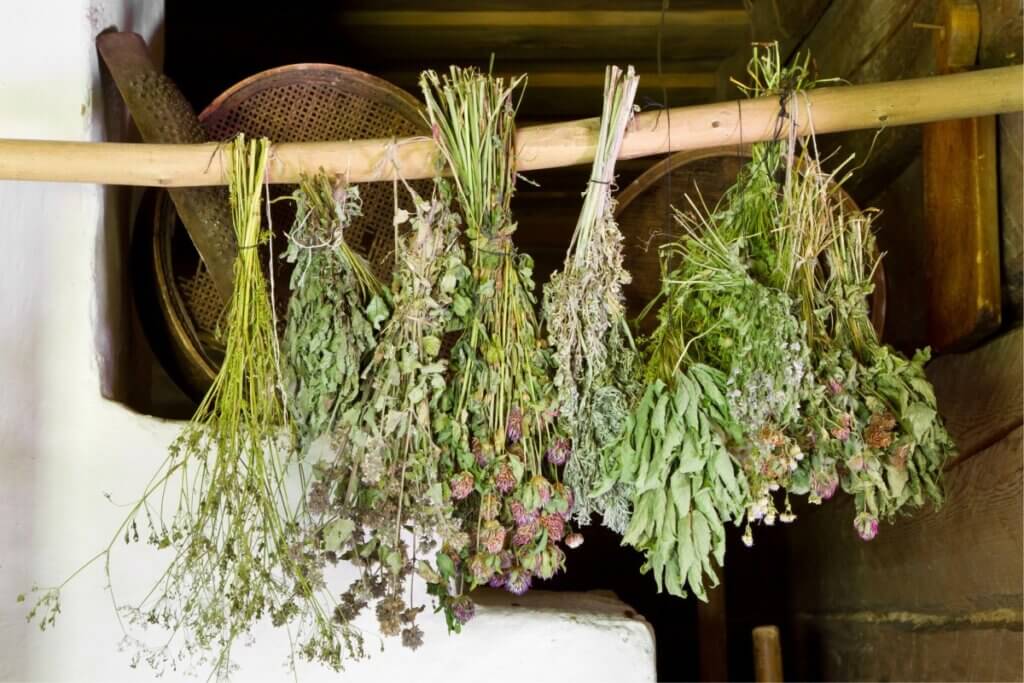
More Posts on Herbs You May Enjoy
- How to Use Herbs and Natural Remedies at Home
- Herbal Home Remedies for Cold and Flu
- 5 Kitchen Herbs You Can Use Medicinally
- Grow a Medicinal Tea Garden with these 8 Herbs
- Medicinal Kitchen Herbs (6 Herbs You Should Grow)
- Best Methods for Drying Herbs for Stronger Medicinal Properties
- Plant These Medicinal Herbs in Fall for Herbs Next Spring
- How to Make Nettle Leaf Tea
Melissa K Norris: Hey, pioneers. Welcome to episode number 322. Today's episode is all about using rose hips for natural medicine, including why we should be growing our own rose hips, the benefits of consuming rose hips, how do we harvest them, how do we prepare them, how do we dry them, and then what are all of the different ways that we can use rose hips, what do they go best in, how do we pair them with flavors, especially if we're looking at cooking with them or using them with other herbs in making medicinal teas, and which types of roses should we be getting are rose hips from.
Melissa K Norris: This is a jam-packed episode all about rose hips with a very special guest and personal friend of mine, which you have heard from in the past, but I wanted to bring her back on especially to talk about this topic. Welcome to the Pioneering Today Podcast. I am your host, Melissa K. Norris, fifth generation homesteader, bestselling author of multiple books, including The Family Garden Plan, creator of the Pioneering Today Academy, as well as the website melissaknorris.com, and all of the social media channels.
Melissa K Norris: I help hundreds of thousands of people between the website, this podcast, the YouTube channel, Instagram, the academy, and my courses to live a homegrown and handmade life using simple, modern homesteading. I am thrilled that you are here and I get to help you as well. If you are not already on the wait list for when my herbal course releases to the public on October 20th, you need to go and jump over and get on that wait list.
Melissa K Norris: Because if you are interested in, today's topic, oh my friend, I have so many things that are going out to the people who are on the wait list and free resources that you are going to want to get your hands on. Go to melissaknorris.com/herbclass, and then you'll just click the button that says "yes, sign me up." Pop in your name in email and you are going to get a ton of information on how to confidently and effectively use herbs at home, as well as the absolute best price that it will ever, ever be when it launches on October to 20th.
Melissa K Norris: There are some other goodies that I just can't tell you about yet. If you're on the wait list, you'll get them. So go on over there and get yourself signed up. Today's episode, as I said, is with a good friend of mine who is CeAnne from Farmhouse Teas. Many of you are probably very familiar with Farmhouse Teas, especially if you're in at the academy and have went through any of my herb training. CeAnne has been a supplier of ours. She's one of the few people I would ever trust with my formulas.
Melissa K Norris: She has created kits full were members so that you can easily get all of the supplies if it's not herbs that you are growing on your own yet and get those in your hands and in your natural medicine cabinet. CeAnne helps farm loving families turn common herbs into powerful medicine without the overwhelm. She along with her husband are the owners of Farmhouse Teas and a provider of high quality organic loose leaf teas with a focus on herb and wellness tea.
Melissa K Norris: Not only do they blend delicious herbal teas, but they also enjoy teaching others how to grow their own botanicals, preserve them, and then turn them into homemade teas themselves. CeAnne and her husband live on a small two acre farm in Oregon where they homeschool, homestead, do home business, and practice herbal medicines. Now, a lot of what CeAnne and I are going to be talking about today, including exact varieties and different things like that, you are definitely going to want to get your hands on.
Melissa K Norris: And in order to do that, you can grab them in the blog post that accompanies this episode at melissaknorris.com/322, that's just the numbers 322, because this is episode number 322. Without further ado, let's dive in to today's episode. CeAnne, welcome back to the Pioneering Today Podcast. It's always a pleasure to get to chat with you.
CeAnne Kosel: I'm so glad to come back. This should be fun.
Melissa K Norris: Yes. Well, this is a subject that is actually very near and dear to my heart for multiple reasons, but really because I am getting ready... part of me is trying to talk myself out of it, but the other part of me is so excited. I know which side is going to win. I am putting in a massive both a cut flower, but also herb garden, and I'm discovering that a lot of the plants will go dual purpose and they will do both things. They'll be great for cut flowers, but they also have medicinal purposes.
Melissa K Norris: And one of those is roses, which I don't think many people typically think of a rose as being a medicinal plant, so to speak.
CeAnne Kosel: Right. Yeah. Most people just think it's a pretty plant, and it is a pretty plant, but it has lots of medicinal purposes.
Melissa K Norris: Yes. When we're talking about the medicinal purposes, one that probably some people are familiar of is going to be rose hip. Do all roses actually grow hips?
CeAnne Kosel: No, they don't and that might be one reason that people don't see them as a medicinal plant. That's kind of the more popular roses. The hip part has been bred out of them. It's kind of like a GMO seed, I guess, where it's not going to reproduce later. The hips are where the seed is at. There's only a few varieties that produce rose hips. There's the most well-known dog-rose, the rugosa rose, and there's a few other ones too, but those are the two main ones.
Melissa K Norris: Also because like hybrids, I don't know that there's any GMO roses, but hybrids. I'm assuming a lot of people who are growing roses just for aesthetics or for the looks or for the just pure visual pleasure of them, I should say, don't actually want the rose hip part. They are after just the blossom, and so a lot of that hybrid. I'm assuming it's going to be more your heirloom or your really old fashioned roses is where we're going to be finding the rose hip still on them.
CeAnne Kosel: Right, right. The more wild, like we have a wild rose that just showed up here, they tend to be the more vining kind. They need more maintenance, I guess. Maybe that's not as attractive if you're just going for the bloom, but they're going to be the kind that you need to trellis up and really have to take care of. But then you get the fruit, the rose hips is the fruit, and that's the part where you're going to get a lot of your medicinal properties from.
Melissa K Norris: Which I actually think look really pretty in the fall. We've got some different wild roses that grow on our road. In the fall time, whenever I'm out for a run or a walk, I always think that they look quite pretty when you're going by, even though they're not in blossom. It's just the hip part. They can have some really cool colors. But why should we be growing our own roses for the hips or what is the benefit of a rose hip?
CeAnne Kosel: The largest benefit of rose hips is their vitamin C content. They have, let me see here, it's between four and eight times the amount of vitamin C from an orange. People know orange is to have a lot of vitamin C and vitamin C, of course, is good for supporting the immune system and keeping colds and flus at bay. But rose hips are going to have just way more vitamin C and you can grow them in your yard and many more places than you can grow oranges. It makes it that much easier to grow your own vitamin C.
Melissa K Norris: Especially in more Northern climates because growing citrus, at least here where I am, we are in just enough of a micro climate. I can't even grow... Unless I want to bring them indoor, which I don't.
CeAnne Kosel: It would be the same here in Oregon too, at least in the Northwest side.
Melissa K Norris: That's fascinating though, because even if you can grow citrus, you can get a lot more in a much smaller, I might add. As far as storage wise goes too thinking of that, you're going to get a lot more of the vitamin C. One of the questions, because I've not actually ever harvested rose hip myself, like I've had them in different tea blends or different things like that where the work and stuff has already been done, how do you go about harvesting the rose hips? Do you do it as they're just beginning to form on the rose plant? Is there a specific time that's best?
CeAnne Kosel: Yeah. You want to wait until after the first frost, because they're going to be a lot sweeter at that point. You'll make sure that they're fully formed and everything. When you harvest them, you just want to pluck them off the end. They look kind of like a cranberry, I guess you would say, and you can either snip them off with just some shears or just pluck them off the end. It's pretty easy. It's just like harvesting another fruit, like a berry or something.
Melissa K Norris: Okay. And then I'm assuming you need to dry them. I mean, do they have a high moisture content, or are they already dried on the vine itself, or you do need to actually dry them to keep them for storage?
CeAnne Kosel: They have probably a medium moisture content. It's probably more juice, more juicier than a cranberry, but similar. I would dry them. You could probably use them fresh if you're going to use them right away. But when you dry them, it's going to intensify the flavor of the berry, and so it'll probably taste a lot better that way, plus then you're preserving it for a long time. They'll last maybe 18 months or more after they're dried.
CeAnne Kosel: To dry them, you just want to break them open, and then you probably don't pull out the seeds that are in the middle, depending on how big your berries or your rose hips and what kind you have. The seeds can be really big. Depending on how you're going to use that, you might not want the seeds in there. Plus by opening them up, they'll dry a lot faster that way. I would just cut them in half and deseed them. You can just use a little spoon, depending, again, on what size they are.
CeAnne Kosel: If they're tiny, you probably just have to pick them out with your fingers. And then go ahead and stick them in a dehydrator or maybe dry them in your oven. I don't think I'd air dry these once. Just they're kind of a dense fruit and then the time of year that you're going to be harvesting, it's not going to be very warm, and so you probably don't want to air dry those.
Melissa K Norris: In a dehydrator, I'm assuming... Well, I don't know. I probably shouldn't assume. I get myself into trouble when I assume, but usually when I am dehydrating my herbs for medicinal purposes, I try to keep the setting on the dehydrator the lowest that mine goes is 95 degrees Fahrenheit to keep them at a low temperature to all of the medicinal qualities. But I know some foods, especially if it's the vitamin C that we're specifically talking about, if you have it at a dehydrate setting... I think my berry dehydrate setting is like 125 degrees Fahrenheit.
Melissa K Norris: But I know like some things that doesn't... Vitamin C isn't destroyed by higher heat where some medicinal properties are. Do you know if there's a certain temperature range that one should try to stay in with rose hips, or is it not maybe quite as finicky?
CeAnne Kosel: Roses would be considered a fruit. Just like your berry, I'd dehydrate them at 125. I wouldn't go any higher than 145. It's always better to do it low enough to preserve it, but you want it high enough that you're not going to get mold. A lot of that's going to depend on the quality of air in your house or in your dehydrator. If it's really humid, like say you're in the South versus out here in the West, you're going to have a totally different experience when you're dehydrating stuff, because there's more moisture in the air and it's warmer.
CeAnne Kosel: Whereas here we might have a little moisture, but not near as much, and then it's going to be cooler and more and more prone to mold. I probably would lean towards the higher side. Because if it molds, then you lose all your vitamin C, right?
Melissa K Norris: Yes.
CeAnne Kosel: You want to make sure that that you're drying them at what's appropriate for your environment. I would go between the 125 and 145 just because it's on the fruit side of things. Rather than like an herb, like you mentioned like sage or some other leaf like that, it doesn't need as high a temperature. It's thinner. It's not as thick as a fruit, and it's going to dry a lot faster, so you don't need that higher temperature.
Melissa K Norris: Once our rose hips are dried, then what's the best way to actually use them?
CeAnne Kosel: Oh, you know what I'm going to say to that, don't you? To make tea. We make tea with them. Really there's probably two really good ways. Tea is one of them, but a syrup would be the other way, which essentially is just a tea that's infused on the stove top for a really long time. Well, compared to tea. If you're drinking it with tea, it would just be steeped in water for five to so seven minutes. If you're going to make a syrup that's going to be steeped in water on the stove or depending on how you do honey or a sugar water or something for probably 20, 25 minutes until it's reduced by half.
CeAnne Kosel: But a syrup or tea would be the best way to use those. You could also tincture them in an alcohol or a glycerin-based tincture. Since it's considered a food, you could cook with them any way that you would cook with a berry.
Melissa K Norris: Okay. Does the actual hip when you cook with it... I mean, is it... What's the texture of it? I guess that's what I'm trying to ask.
CeAnne Kosel: It's going to be... Let's see. I can't think of anything that's really common that you would use. The closest I could come to is like a dried cranberry, but it's not going to have that flexible texture. It's going to be more like a dried onion, if that makes sense, like the little onion chips. It's going to be crispy instead of pliable. If you're cooking with them, you're probably going to want to make sure that they're rehydrated a bit before you...
CeAnne Kosel: I mean, you could throw them in your muffin like a cranberry. If you're making like a cranberry muffin or something, you could use rose hips instead. But I would probably rehydrate those a little bit, depending on your muffin and recipe, because they might take up a bit of water. You don't want those crispy chunks in there so much.
Melissa K Norris: Right. And then as far as like flavor profile, so if you're using them as the only ingredient in the tea and/or looking to pair it with something else, what's just the natural flavor, and then what else is really good to pair with them?
CeAnne Kosel: I would say it's somewhere between hibiscus and cranberry. It's got its own unique flavor, so it's kind of hard to pin, but it's not quite as tart as a cranberry. It would lean towards the hibiscus side. So either one of those would be really good to pair with. Anything you would pair a cranberry with, excuse me, would be a good thing to put with it. Let me think what we put them in. Any berry, like a blackberry, raspberry, strawberry.
CeAnne Kosel: When you're blending a tea, those other berries don't always bring out a bunch of flavor because they're just not intense enough, but a rose hip is super intense. It'll actually pull out the flavor of those other berries. I'm trying to think of what else all your spices like cinnamon and nutmeg, ginger, clove, all those kinds of things would be really good with it. Anything you would make with a berry would be a really good pairing with it.
Melissa K Norris: Okay. And because of the vitamin C content, is that an ingredient that you would put in like an elderberry syrup?
CeAnne Kosel: Yes. In fact, we do do that with our elderberry syrup mix use here on the farm. It's a really good pairing to go with your immune boosting elderberries, and then you have the vitamin C. You can add other stuff to it too to really get a great elderberry syrup mix rather than just your street elderberries.
Melissa K Norris: When you said cranberry, I don't know why, all of a sudden I have visions of cranberry with mint. I'm wondering like rose hips with mint?
CeAnne Kosel: Yeah, that would be good. A minty... I'm trying to think if we have anything along that line. We have a called High Desert Hibiscus. I mentioned the hibiscus pairing with it, and that has spearmint in it. It makes it kind of a tropical fruity flavor. Yeah, it's a good pairing. Kind of lightens it up a little bit, because the rose hips can be... Like a cranberry it's kind of an intense flavor. The mind can kind of lighten that up a little bit.
Melissa K Norris: Is there a standard amount of rose hip like per a typical six to eight ounce cup of hot tea that you would use?
CeAnne Kosel: Right. Just a teaspoon for one... You might want to adjust that based on your taste preferences, because it can be really intense. Generally one teaspoon per six to eight ounces of boiling water will get you just a standard cup of tea. If you're looking for like a medicinal cup, you want to go with a longer infusion, maybe 15 minutes and maybe up that teaspoon to a tablespoon. That's only if you're going to be able to get it down, because it might be pretty tart and it might just be an overbearing flavor.
CeAnne Kosel: If it's too intense, I would just sip the regular cup more often so that you're getting more down in the long run versus all at once.
Melissa K Norris: Okay. Back to the growing, because one of the things that... I don't know if anybody else is like this, but I feel like I'm kind of like all in or all out. I'm like, okay, if I'm going to be growing roses for medicinal purposes, then I want to make sure that I have enough roses planted, that I will have a year's worth of rose hips. I know from vegetables and everything else that we grow that that's going to vary based upon the size of your family and how much and how often you're consuming it, of course.
Melissa K Norris: But would one rose plant provide enough rose hips for a family, or would you recommend... I'm sure versus a young one versus mature plant, of course, I know there's going to be a difference in that, but in your typical experience, how many do you think you would want?
CeAnne Kosel: Goodness. Well, I'm probably a really sad example because we have the worst soil for growing roses in existence. Our soil is just way too wet. My bushes are really, really small and they don't tend to produce a whole lot. I think that's going to make a huge difference. I would say I don't even know if one plant will give you enough for one person. You know it's going to depend, of course, on your use, how much that plant is growing, what kind of soil it's in, what kind of row you have, they're going to produce different amounts of hips. That is a really hard question to answer.
Melissa K Norris: Right.
CeAnne Kosel: But I would say one plant for whole family wouldn't be enough. I would go with at least one per person, and then maybe go from there depending on what your soil looks like, what kind of plant you have, what kind of harvest do you get off of it.
Melissa K Norris: It's very hard because I often get asked the same question like, well, how many do I need to plant of XYZ? I've got a general chart, but I always have to lead with all of those qualifiers, right, and to figure it out for you, because it is really hard. With growing roses though, because honestly growing roses is not something... The vast majority of my growing experience is vegetables and fruits and fruit trees and berries. You said they don't like really wet soil.
CeAnne Kosel: Right.
Melissa K Norris: But what other things do they like?
CeAnne Kosel: They like well-drained soil, partial to full sun. I don't know on the acidity side. I'd have to look that up to be sure. But I mean, they're pretty durable because they're still alive here in my yard, but we're going to be moving them from where I wanted to put them because it looked nice to where there's better soil. We just have a lot of clay and a lot of rock, and so it doesn't drain. Where they're sitting at now, they're just kind of sitting in a little... It's almost a pond. It's just really wet right there.
CeAnne Kosel: And then if we go down the hill to my brother-in-laws, they have roses and theirs are doing wonderful, but they have like sandy soil and it drains really, really well. I think that water's really important. And then beyond that, they're pretty durable plants.
Melissa K Norris: They don't like to have wet feet. And then how about nutritional load? Are they heavy feeders? Do they like to have a lot of nutrients? Does it need to be really fertile soil or are they not quite so picky?
CeAnne Kosel: I would say they're not picky. If we go looking at mine where clays got a lot of minerals in it, despite the lack of drainage. But then down the hill where there's sand, they don't have all those nutrients that are doing great. I don't think that they tend to be heavy feeders.
Melissa K Norris: Okay. That is good. I know... And this may be more hybrid than some of the heirlooms, because I know sometimes when you get into hybridization, then there's different elements. But I know a lot of people like to add extra calcium and potassium like banana peels and egg shells around the base of their roses is something that I've seen tossed around a lot online. I should say it's not something that I've done a ton of research on because I don't really grow roses.
Melissa K Norris: Well, I'm really excited to try rose hips, and I do actually have one other question and different perusing when I've looked at rose hips and using them. Do they have like little tiny hairs inside of them that you need that can irritate the throat, or is that taken care of once they're dehydrated? Or is that I don't want to say a myth, but is that something that you don't really need to worry about?
CeAnne Kosel: I haven't seen anything on the ones that I've cut open, so I can't say for sure. I wonder if it depends on the kind, maybe the size of the rose hip if they get big. In my reading and everything, I haven't seen any warnings about that or anything. With tea, you're not consuming the actual fruit. You're consuming the liquid from it, so that wouldn't be a problem there. If you're making a syrup, it would be the same way. Unless you're eating them whole, maybe you're cooking with them or something, I would think that cooking it would break it down so that it wouldn't be an issue.
Melissa K Norris: Okay, awesome. It's really funny. The more I discover with online, like sometimes you really have to dig because there can be some really peculiar things that people think about certain things and then people just pass it along. And then when we actually get to it, you're like, "No, that's not a thing at all." I figured you would be the person to ask about that, because I thought if I have kind of heard that or run across that, I'm sure someone else has seen that too.
CeAnne Kosel: Right. The only side effects I've listed here, and now these are for rose petals, so I would have to dig a little I think to look at the rose hips, but roses can have an antidepressant effect and has blood thinning quality. I know for you and like your son, that could be an issue. Those are the petals though. I would have to dig in and look specifically on the rose hips to see if there's any side effects or contraindications with medications.
CeAnne Kosel: Of course, I always encourage everyone to really dig in before they start things medicinally and make sure they fill out a medical sheet and look up all of those things and make sure that for their own person that that's a good fit for them and that there's not going to be any issues there.
Melissa K Norris: Yeah. I'll definitely look into that. My daughter has a blood clotting disorder.
CeAnne Kosel: It is your daughter.
Melissa K Norris: I don't expect... You remember that somewhat in my family did. [Crosstalk 00:25:06] I'm highly impressed, but it's been really interesting. Because with that, I have to look at every single thing and be like, what is the actual pathway in the body that it's taking that would cause this, or why is this a precaution, all of that. Because like eating ginger culinary, like if I throw a teaspoon of ground ginger in a bread recipe or a cake recipe or something like that, she's fine.
Melissa K Norris: But eating dehydrated ginger candy is probably not a very good idea for her.
CeAnne Kosel: Right. That's a larger amount.
Melissa K Norris: Yeah. I'm like, "Don't do that," but she'll have ginger just as culinary food wise. But then when it comes to medicinal, then I tend to be a little bit more care full in that. But it's been really interesting because the deeper I dig into it, there are some things that are more of a... Of course, you have to do research and I always research from more than one spot and really dig into it. But there are some things that have that certain warnings on it for things. But then when you actually get into it, it's more like it's suspected or theoretical.
Melissa K Norris: And not that we shouldn't pay attention to those because we should, but some of it has not shown that in actual clinic data or clinical use from practitioners. It's been really interesting, but I think it's always really wise to pay attention to those and then dig in just like you were saying in order to be safe with that. But the antidepressant part is really interesting, especially for people who live in the Northern hemisphere.
Melissa K Norris: Because as we move into those winter months, not only do we have very little sunlight and we're low on vitamin D as well, but a lot of times people will have the SAD, which is the seasonal affective disorder. Did I say that... Yeah. Knowing that it could have the antidepressant parts actually could be really great because in the middle of winter, that's when a lot of people are affected by it. Not only were they beginning that vitamin sea boost, but possibly some of the other.
Melissa K Norris: Of course, we're not making a medical claim, but that's very fascinating to know about that. I actually will be very curious. I'll have to do a little bit of research too, and we can put in the blog post that a accompanies this episode if we find anything specifically if that correlates with the rose hips, as well as the rose petals with that because I'll be really curious to see.
CeAnne Kosel: Yeah, if it applies on both, and I just don't know off the top of my head. I'd have to look at my notes. We do have in our herbal studio, we have a monograph on roses and it would cover all of that stuff.
Melissa K Norris: Okay, awesome. Well, we'll make sure in the blog post that a company is this episode we'll put some extra links and information to some different sources. For anybody who is listening that wants to see that and look at the literature a little bit deeper, then you'll be able to do that. Well, CeAnne, thank you so much for coming on and helping us navigate through rose hips. I'm going to be checking out those two varieties that you mentioned and seeing about getting some of those to add into my new herbal cut flower garden that's going to be going in.
CeAnne Kosel: That'll be exciting. I can't wait to see it.
Melissa K Norris: I'm excited, but now I'm nervous because I just put it out there. So now I'm like, oh, I'm super committed now. Yes.
CeAnne Kosel: Well, if it doesn't work, you just learn the lessons for us and then share those.
Melissa K Norris: Amen. That is a very good way to at it. Well, thank you so much for coming on, and I know we will be chatting again soon.
CeAnne Kosel: All right. Thanks for having me.
Melissa K Norris: I hope that you enjoyed that episode, and I hope that you are joining me for the herb class, not only on the wait list, but I'm also going to be teaching. If you're on the wait list, you will get an invite to that and a link to join a free live herbal class that is really amazing. I've had attendees who have attended it when I did it last year who said that they got so much information from it and were able to make changes that benefited them well into the fall for winter and cold season and even throughout the whole rest of the year.
Melissa K Norris: And I only teach it once a year. You want to make sure that you head on over to melissaknorris.com/herbclass and get yourself signed up for all of those goodies that we have coming. Thank you again for joining me. We have got another amazing episode coming your way next week where we are going to be talking about getting started with centuries old hookah culture gardening. For now, blessings and mason jars.
Sign up to receive email updates
Enter your name and email address below and I'll send you periodic updates about the podcast.
